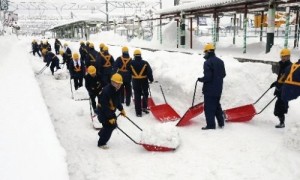100s of JR Workers Clear Snow for Japanese University Entrance Exam Takers
In my previous post on the Japan University Entrance Exams, I mentioned that we would be seeing some feel-good news about people making efforts to make sure the high school seniors can make it to their tests on time.
Here’s the first one I spotted… probably more to come.

Akita JR workers spent hours shoveling snow off the tracks to be sure that future college students would be able to make it to their exams on time. The workers were clearing the area around Yokote Station near Akita Prefectural Yokote High School where about 800 students were expected to take the exam.
They were digging out after the area saw over 100cm of snowfall stopping trains.
Feel-good stories about the sacrifice of their youth to rote learning, to earn a place in school that will leave them debts but few guarantees in a declining nation. About time for a new paradigm.
It’s going to be tough for education to be changed. Yutori kyoiku is considered a huge failure, although I think it would have worked better if schools had committed to it. Cancelling classes on Saturdays only to have the kids come in for all day club activities hardly opened the door on increasing unstructured play and providing more family and enrichment time.
Now there’s a whole generation that is being used as an example of how Yutori failed… with no real studies of how it was implemented, what happened, and how much of a “failure” it really was.
I taught in Japan both before and after Yutori, and really the hours kids were in school under the watchful eye of “sempai” or “teacher” or “coach” never decreased. Many parents are against Yutori because they fear it will increase the time they actually have to be responsible for their children.
There are good parents, teachers, and students in the mix as well, but they will succeed no matter how the educational system goes.
Looking forward to seeing the test in Monday’s paper.
Thank you for the thoughtful response to my cynical comment. To continue my cynicism, the problem with ‘Yutori-Kyoiku’ is the most obvious one: it’s implemented by Japanese people. I like the country and I love my wife, but the culture has two fundamental problems with planning: it plans too much detail, and it never allows for a ‘plan B’. ‘Western’ culture has its own issues, and I can tell you that education in Ontario, Canada is full of asinine. Japan is wound up so tight that they have to structure their ‘free-time’ with more detail than ‘work-time’: they get a lot more done at their hobbies, or should I say they get a lot less done at work?
Sorry I’m so late responding to your response.
Actually, cynicism is the best thing that can happen to the field of Japan studies. When I tell people the truth about my experiences in Japan (good or bad) anything negative is met with disbelief. I attribute at least a part of this to the fact that so many of the “great” Japanologists were Japanophiles at the same time. Couple that with how people in Japan tend to treat even long-term residents as guests or even children in some ways, and the propensity for some people to get by on a “gaijin pass” (a play on the Japanese “kao pasu”), and a lot of people’s misunderstandings about Japan come to light.
I like your blog and the growing number of cold, hard, and open blogs that show the real Japan and not just an overly positive, under-educated skew.
Thanks again for the comments and intelligent discussion.